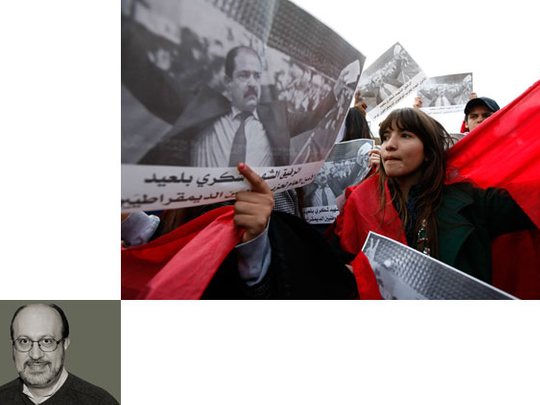
Two years into epochal revolutions that changed the Arab World, commentators identified alleged power vacuums that, apparently, were filled by extremist movements. The fear that Salafists would replace repressive dictatorships gained popularity as tensions in Egypt, Libya, Tunisia and especially Syria, preoccupied analysts. Some were wondering, for example, whether Syria would become an Islamist state. Others anticipated profound transformations in North Africa.
Were Salafist challenges true existential developments that were about to negate the progress associated with the dramatic changes that befell the Arab World?
It was naive for Munsif Al Marzouqi, the President of Tunisia, to claim that few in his Al Nahda-dominated government “realised how dangerous and violent Salafists” were. Although Marzouqi stressed that “a tiny minority within a tiny minority” did not “represent society or the state” and were, consequently, not “a real danger to society or government,” the recent assassination of opposition leader Shukri Belaid threatened to significantly harm the 2011 Jasmine Revolution. What emerged in Tunisia was genuine political mistrust as elites disagreed on which direction to follow.
Similar questions were raised elsewhere in classic power struggles. In Egypt, for example, a hardline cleric — Mahmoud Sha’aban — felt no compunction to call for the deaths of two key opposition figures, Mohammad Al Baradei and Hamdin Sabahy, during his “pseudo-religious” television invocations.
In Libya, extremists were implicated in a spate of violent attacks, including a September 11, 2012, assault on US diplomatic facilities in Benghazi, in which US Ambassador Christopher Stevens and three other Americans were killed. Dozens of Libyans perished as well and it was safe to assume that Islamist groups throughout North Africa, from Egypt to Algeria, were fully mobilised.
Still, such ambitions required perspective, especially since those involved in violence, or those who simply encouraged violent opposition to transitional governments struggling to restore legitimising forces, represented nothing more than the tiniest of minorities. In other words, it was important not to blow their accomplishments out of proportion and to give them more credit than they deserved.
To be sure, extremists relied on incitement against opponents, with Salafists seeking to integrate into the political process to further legitimise their actions. Others appreciated how dangerous such provocations could be and called on their supporters to refrain from issuing death threats or engage in violent demonstrations. The Jama’ah Al Islamiyah in Egypt, for example, rejected assassinations as a political tool, while the country’s largest Salafist group, the Nour Party, criticised “all forms of violence”. Interesting intra-Salifist debates were ongoing, as putative leaders sought to gain influence and, equally important, ensured that followers remained disciplined. In fact, Salafist officials appreciated the potential that violence would seriously negate post-revolutionary gains and did not wish to surrender hard-fought victories. A few even welcomed dialogue with so-called secular groups.
When Nour Al Deen Al Khademi, an Iman affiliated with the pro-Salafist Al Fatih mosque in Tunis, became Minister of Religious Affairs, enough pressure was exercised on him to guarantee that hundreds of mosques taken over by Salafists were once again entrusted to moderate clerics. Similar cases emerged in Egypt and Syria as well although an undeniable polarisation with Christians in both countries coloured eventual reconciliations.
There was no denying that some of these extremists were loud. Yet, and no matter how much they shouted, the Arab Spring was not just sprouting Islamists, given that moderate voices were equally strong and vocal. Indeed, the most recent election of the Egyptian Grand Mufti, Shaikh Shawky Abdul Karim Allam, attested to the phenomenon. A professor of jurisprudence from a provincial university in Tanta in northern Egypt, Allam secured the highest number of votes, as senior Al Azhar clerics chose him. He defeated Shaikh Abdul Rahman Al Bar, a prominent cleric in the ruling Muslim Brotherhood, who was tipped as a shoe-in because of his political affiliation. Importantly, Al Bar’s past service within the Brotherhood guidance bureau proved to be insufficient to secure the post.
By choosing a moderate voice, Al Azhar clerics rejected any Brotherhood efforts to further politicise the revered institution, distancing it from initiatives that intended to obtain its imprimatur on the contentious constitutional debate that rocked and continued to destabilise the political establishment. In other words, Allam’s election illustrated that Al Azhar leaders did not wish to become pawns in the hands of extremist political groups, which bode well for Egypt.
Beyond Allam, a largely apolitical figure, the country’s wise religious figures understood that one must not replace one dictatorship with another. Moreover, they telegraphed that Islamists emerging throughout the region ought to be “managed,” lest the most recent tiger of change usher in calamities galore.
Because Arab dictators tortured thousands of Islamists over the years, as the Zine Al Abidine Bin Ali, Muammar Gaddafi and Bashar Al Assad regimes, among others, exercised crackdowns involving mass murder and repression, the current Salafist growths were part vengeance and part vindication. Nevertheless, past grievances cannot possibly justify the on-going bloodshed and, it is critical to clarify, few can monopolise righteousness. In the end, and no matter how hard political extremists tried to advance religious rectitude above stability and freedom, what dejected Arabs wished for was prosperity for all. Arab masses craved for an end to extremism and corruption and patiently waited to see history’s verdict.
Dr Joseph A. Kechichian is the author of Legal and Political Reforms in Saudi Arabia.










